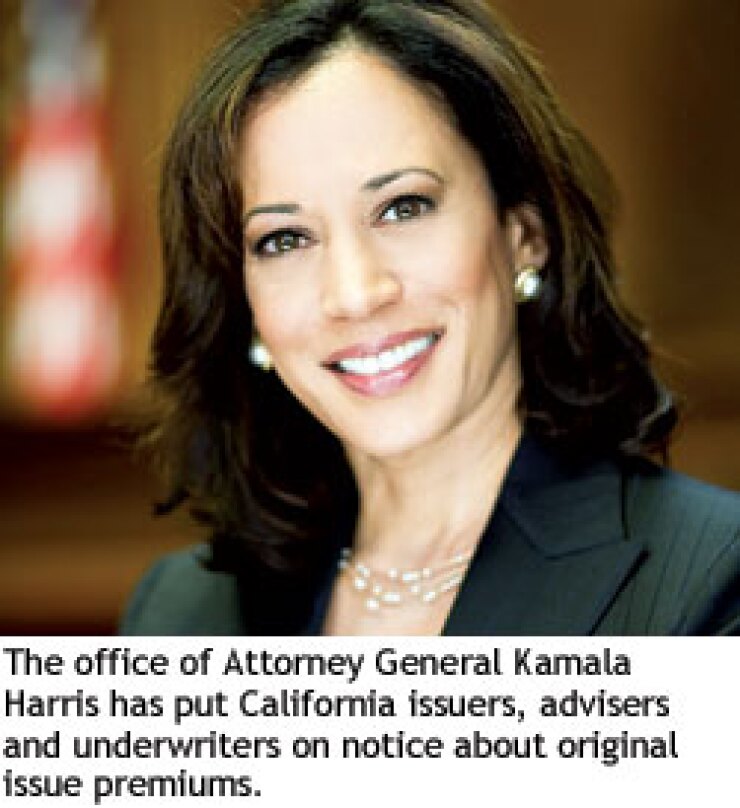
ALAMEDA, Calif. — California’s attorney general appears to have thrown a monkey wrench into school districts’ common practice of paying for issuance costs using original issue premium.
The attorney general’s office put issuers, attorneys, advisers and underwriters on notice
“As we understand it, the school district is offering to sell otherwise authorized bonds at a premium in exchange for additional upfront cash. This cash would then be used to pay the costs of bond issuance and interim financing,” according to the letter, which was dated March 1 and signed by Constance LeLouis, supervising deputy attorney general, on behalf of state Attorney General Kamala Harris.
Harris, the former San Francisco district attorney, won the office in the November election.
“It is our office’s view that this proposed use of premium for costs of issuance as described in the complaint is not authorized by the law,” the letter said.
Bond attorneys, underwriters and advisers contacted for this story either did not return phone calls or declined to comment on the record. Off the record, sources said that the practices cited in the letter from the attorney general’s office have been routine for years, even decades.
The letter, addressed to attorneys for the Poway district, cited a validation action the district brought in advance of its planned bond sale.
“While we did not answer the complaint in this matter, we remain concerned with the school district’s proposed bond issue,” the letter said. “We trust that you will inform your client, bond counsel, and any other appropriate officials of our concerns.”
A district court in San Diego County entered a judgment March 2 in favor of the district and its validation action.
The deal has not been calendared. The Poway Unified school board in October authorized issuance of $105 million in GO bonds.
The practice the attorney general is targeting appears to be same as that used by the Northern Humboldt Union High School District, to cite a transaction plucked from a recent bond calendar. It was not cited by anyone contacted for this story.
De La Rosa & Co. priced an $8,000,222.70 general obligation bond issue for the district on Feb. 24.
That transaction generated an original issuance premium of $283,804.60, according to the official statement.
The OS reported that exactly $8,000,222.70 of proceeds were deposited into the building fund, while the vast majority of the premium, $276,561.85, paid for issuance costs, with the $7,242.75 balance left for the debt service fund.
“Costs of issuance include legal fees, financial adviser’s fees, underwriter’s discount, printing costs, rating agency fees and other miscellaneous expenses,” the OS says. “Costs of issuance will be paid by the underwriter from a portion of the original issue premium retained by the underwriter from the sale of the bonds.”
According to the attorney general’s letter, California law is clear that any premium, “even if legitimate,” must be deposited into a special fund and applied to pay debt service.
“Further, the practice of artificially inflating the interest rate to generate premium for unauthorized uses translates into additional bond proceeds over and above what the voters authorized,” the letter said. “Thus, by diverting premium to unauthorized uses and by artificially inflating interest rates to generate premium, the School District is not acting consistent with statutory law, and is also incurring debt beyond what the voters authorized in violation of the California Constitution.”
The attorney general’s office made it clear that its interest extends beyond Poway.
“Although we are mindful of the costs of litigation to school districts and municipalities around the state, we will scrutinize proposed bond issues such as this in the future,” the letter said. “Should such practices continue, we may be compelled to intervene.”
This is not the first time a California attorney general has taken an interest in school bond premiums.
In January 2009, the office, then headed by Jerry Brown, issued an opinion, triggered by a lawmaker’s request, finding that the practice of “cash-out refundings” violated the state’s constitution.
In such transactions, school districts sold refunding bonds at a premium above par to generate additional proceeds for school bond projects, rather than refunding for debt-service savings passed on to the property taxpayers who pay the debt service on the bonds.





